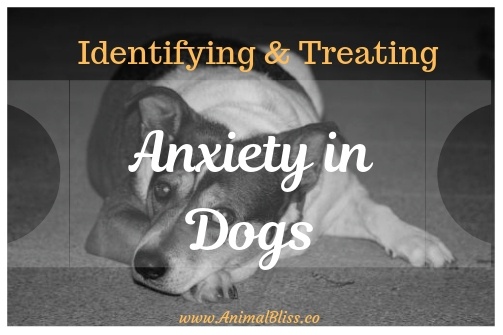Identifying and Treating Anxiety in Dogs
For most people, their dogs are more than just pets. These canine critters are beloved companions and members of the family in every sense. Dogs are often such loyal, fun, and happy creatures most of the time that many people don’t realize that dogs can suffer from a lot of the same mental ailments that we do. Anxiety, chronic or otherwise, is one of them. Various triggers can set off a dog and give rise to long-term anxiety problems that adversely affect their behavior. Here are a few of the things to look out for in identifying and treating anxiety in dogs.
Recognize the Signs
Dogs show signs of agitation just like humans do, but the symptoms they may offer can be somewhat different from ours. Because dogs are unable to speak the way humans do, most of their communication comes through body language. Flattened ears, bared teeth, and walking in place are clear signs of stress and uncertainty in a dog when happening together. More subtle signs, however, include licking their lips, panting, or wagging their tails low to the ground. Dogs who are feeling anxious also tend to mark their territory (pee on things) frequently and lash out with nips and bites. These are not malicious behaviors, but rather signs that your dog doesn’t feel safe and secure.
Related:
Music Therapy to Calm Your Dog
Consider Training Classes
Training classes for dogs can be an excellent way for some people to bond with their pets. A professional training course will teach you how to communicate more effectively with your dog rather than focus on discipline and dominance. Uncertainty is a serious cause of anxiety for a dog, and they are much happier when they know what you want and how to give it to you. If your dog is unable to work with you and continues to act aggressively towards others, then it is essential that you keep them away from other people. If your dog bites someone, you are personally liable for the damages they cause, and you may need to consult a personal injury attorney to set up a defense against personal injury litigation against you.
Related:
Do you Really Understand Your Dog’s Anxiety?
Look for Medication
Sometimes, humans develop anxiety disorders from hormonal imbalances in their bodies, which means that, regardless of their environment or the actions of those around them, they will be prone to anxiety and fear. These people require medication to counteract those hormonal imbalances, and the same can apply to dogs. If your dog is acting anxious and upset regardless of a stable home and a communicating family, they may have an anxiety disorder that requires treatment with medication. While some people are wary of giving sedatives to their dogs, your pet will be much happier and healthier when they can be calm and enjoy their surroundings rather than be hounded by irrational fear.
Related:
CBD for Your Dog – Important Things You Should Know
Be Careful with Change
It is possible that a new factor has entered an anxious dog’s environment. Some dogs can perceive new things as threatening, such as a new animal in the home. A common issue with dogs is that a family will introduce a new pet to the household, and the anxiety of the constant, unfamiliar presence can cause a dog to be continuously anxious. This is especially true when the new animal is hostile to the dog or intrudes on a dog’s perceived personal territory a lot. The best solution is to introduce pets gradually to your dog and let them get to know the animal before making them a permanent fixture in your home. Watch carefully to make sure that the two pets get along well, and let your dog keep a doggy bed or blanket as their own they don’t have to share. If the issue doesn’t resolve, then the pets may not be compatible with living in the same home together.
A dog’s mental health can affect its moods and well-being the same way that it affects people. Taking great care of your dog might involve dealing with some canine anxiety, and the tips on this list are just a few of the ways any dog owner might find and treat their pet’s fears. Take the time to explore a variety of causes before resorting to medication, but don’t rule it out entirely when your dog is left with chronic anxiety.
~~~~~
“Identifying and Treating Anxiety in Dogs”
Guest Author: Meghan Belnap (see BIO below)
*** Please Share ***
Identifying and Treating Anxiety in Dogs #PetHealth #PetBlogShare #AnxietyDogs Share on X![]()
![]()
MY QUESTION FOR YOU:
Does our dog experience anxiety? What helps him to relax?
*** Leave your comment below. ***
(It’s just sexy!)

Peace
DISCLOSURE: Animal Bliss is a participant in the Amazon Services LLC Associates Program, an affiliate advertising program designed to provide a means for us to earn fees by linking to Amazon.com and affiliated sites.
(In other words, we’ll get a very small (teeny tiny) commission from purchases made through links on this website.)
So, go on … Don’t be shy!
Buy Something BIG and Expensive!
Buy a Jaguar. Or a Ferrari.
Thank you!
😀
[amazon_link asins=’B07NPZP1SF,B01FN4GW2M,0757320791,0544334604,B00EBDXS7E,B01B3HAVMU’ template=’ProductGrid’ store=’animblis-20′ marketplace=’US’ link_id=’d6d89d29-f9c0-4745-878f-a0311c357fce’]
😆
- 4 Dog Breeds That Are Great for Apartment Living - October 18, 2019
- Is Your Pet Skittish with Visitors? 4 Tips to Prevent Incidents - October 16, 2019
- 4 Reasons Why Large Exotic Pets are Not Urban-Friendly - May 22, 2019


